If you plan on taking the SAT® or ACT® this year, you may have a specific goal or score range in mind that you would consider “ideal.” You might believe that with this ideal score, you’d be able to confidently submit your scores to all of your top college choices. But…What if you don’t earn your ideal score? What if instead of focusing on a positive exam outcome, you incessantly worry about the possibility of a negative one?
According to scientifically-proven facts, failing to get your ideal SAT or ACT score will likely result in…
- …an 80% chance of never gaining admittance into your college(s) of choice.
- …a 60% chance you’ll score even lower should you choose to take that test again because you are probably just a bad test taker.
- …a 44% chance you will miss out on a job opportunity after college because a potential employer will judge your test score.
- …a 99% chance all of your friends will find out and laugh at your inability to score as high as everyone else in the school obviously did, and they will continue to laugh until you expire from the humiliation of it all.
- None of the above.
The answer to this multiple-choice question is (thankfully) "E," but the often relatable fears rooted in the other answer choices come from something else entirely—that’s test anxiety, and the real solution is to find ways to deal with it.
Test-Taking Anxiety: Recognizing the Problem
To understand how to deal with test anxiety, we first need to understand what it is. Simply put, test anxiety is an extreme sense of worry before or during an important exam. Testing anxiety goes beyond the common rush of nervous butterflies in your stomach; it’s more intense and can seep into your daily life, making it difficult to concentrate or remember all of the content you’ve worked so hard to remember.
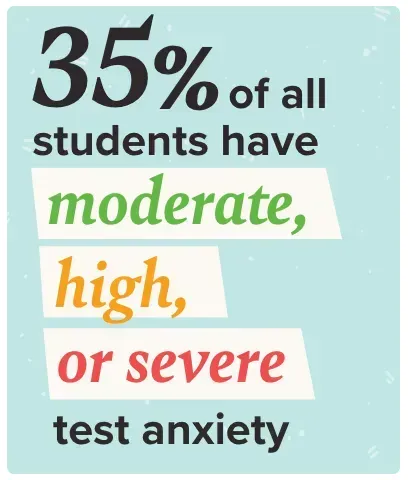
If you suffer from testing anxiety, you’re certainly not alone. It’s estimated that about 35% of all students have at least moderate, if not high or even severe, test anxiety.1 So, if so many people begin sweating bullets at the thought of standardized assessments, what’s causing all the anxious feelings?
What Causes Exam Anxiety?
One of the most typical reasons students become anxious about exams is their fear that they won’t meet the expectations of some of the important people in their life, like parents or teachers. They might think that if they don’t do well, or even as well as their peers, these important people won’t respect them as much or may even believe they lack intelligence.2
Another reason students may feel anxious is if they believe that their grades on tests show how smart or competent they are. This idea would be enough to make anyone feel bad about themselves, especially if they didn’t reach their score goals.
Placing too much pressure on the performance of just one test can be an anxiety trigger, as well. Sometimes, not being ready for a test makes them feel guilty and anxious. And, some students may feel like they have no control over how they do on tests, which can be scary.
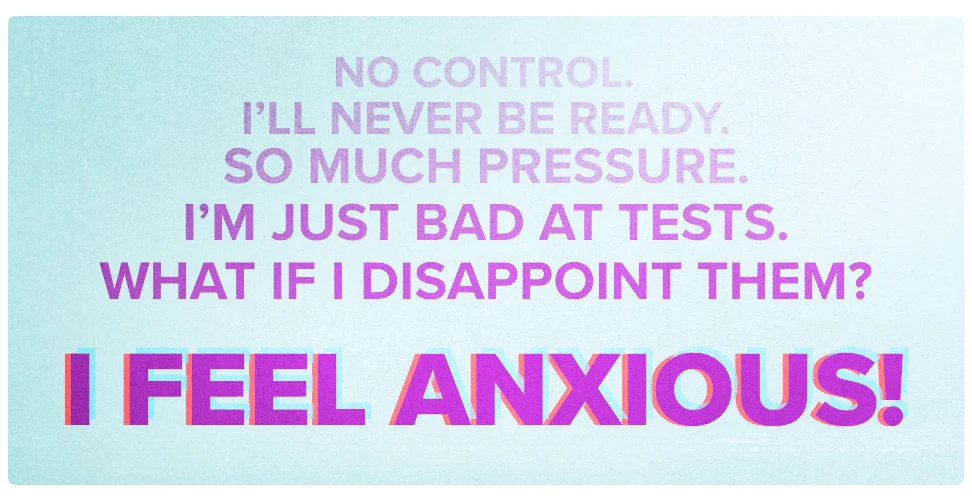
In most cases, all of the above reasons are most-likely untrue or unnecessary–people who truly support you will still think you’re intelligent and competent regardless of any test score–but the feelings behind them are still valid and painful.
Symptoms of Test Anxiety
Understanding where testing anxiety comes from is all well and good, but sometimes it can be difficult to pinpoint whether or not you even have test anxiety. Many students dismiss these extreme feelings of stress because they have become normalized in the context of testing and school. Check out the following statements.3 For each one you can relate to, give yourself one point:
- It’s hard to relax physically before the test.
- Worrying about the test makes it hard to study.
- Even if you study a lot, you still don’t feel ready.
- Your stomach might feel upset before the test.
- During the test, your mind can go blank, and you forget things you know.
- Negative thoughts come up while you’re taking the test.
- You might feel panicky during the test.
| 0-2 Points | 1-4 Points | 5-7 Points |
|---|---|---|
| You’re really good at taking tests without feeling stressed. Exams don’t make you worry; you stay calm and confident. | Like most people, you might get a tad nervous before a test, but it doesn’t bother you too much or affect your every-day life. After the test, you’re able to easily move on. | It’s clear you care a lot about your work, but sometimes that means you get stressed out about tests. But that’s okay, because that means there’s an opportunity to learn test anxiety tips so you can nip it in the bud and can keep rockin’ your exams. |
When someone feels anxious about a test, their body can react in different ways. They might start sweating, shaking, or their hearts may beat faster. In their minds, they might find it hard to focus, think bad thoughts about themselves, or have their thoughts race around. This makes them feel really uncomfortable. They can also feel scared, worried, or even panicked. All of these things can make it tough for them to pay attention and do well on tests.
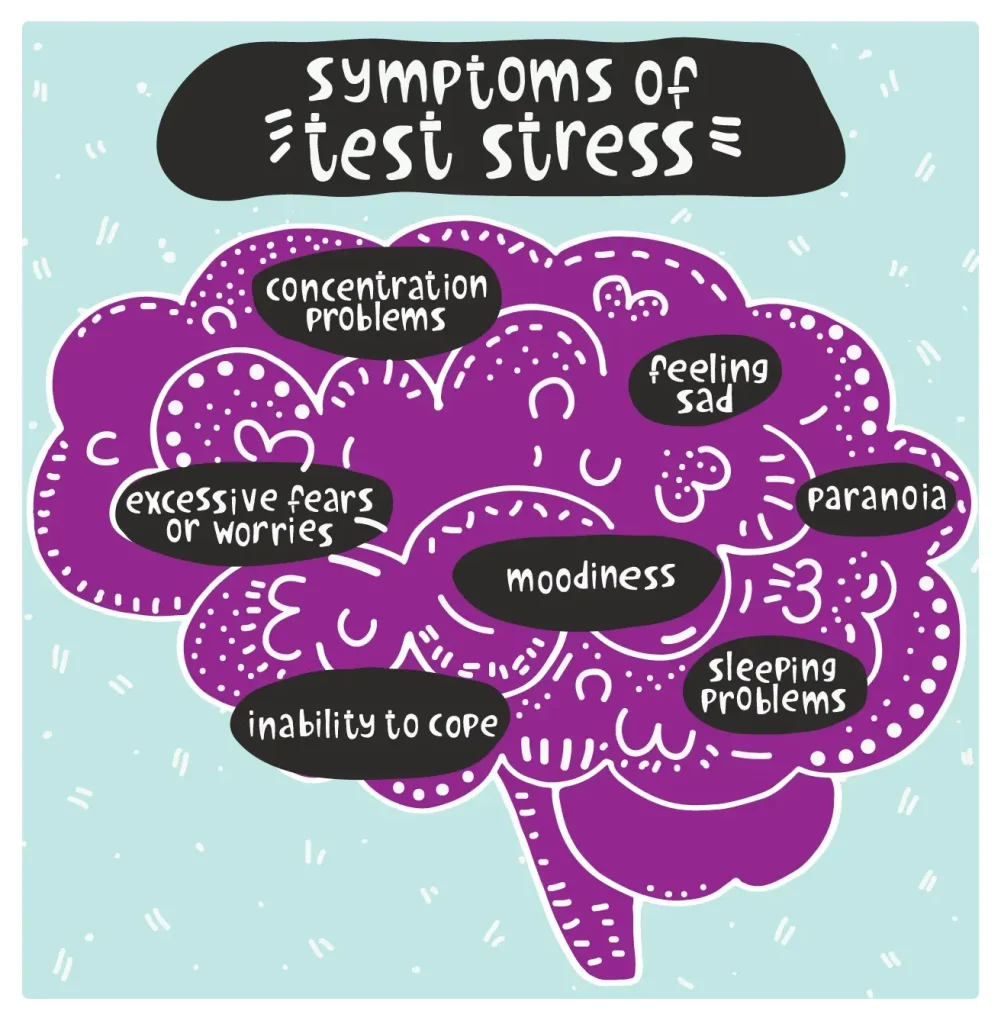
Test Anxiety Coping Skills: The Three Rs
Feeling anxious before a test can be emotionally and physically draining, and it can mess up your test day if you don’t deal with it. The “three Rs of coping skills”—recognize, regroup, and refocus—are a great way to stop testing anxiety in its tracks. These three Rs can be completed in order anywhere and at any time, making it an ideal strategy for before and during an important exam.
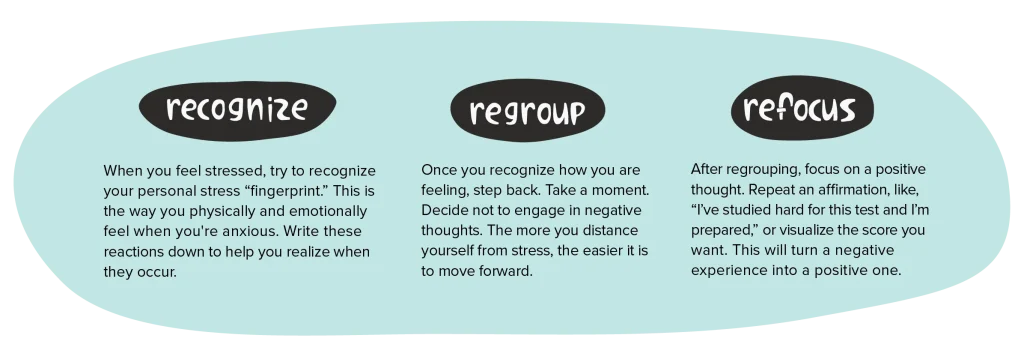
- The first thing to do is recognize how your body reacts when you’re stressed before or during a test. Try to pinpoint your physical and emotional reactions and just take a moment to notice them. Knowing your personal stress “fingerprint” will help you deal with the discomfort of anxiety better.
- Once you can identify your body’s reaction to stress, the next step is to regroup and calm down. You can do this by taking deep breaths, silently counting down from 20, or taking a moment to notice how your surroundings fit into your senses (seeing a desk, hearing the hum of an air conditioner, feeling your chair, etc).4
- Lastly, it’s important to refocus your thoughts and keep going. You can say nice things to yourself or imagine getting a good score on the test. When you turn your nervous feelings into something good, it can make a tough situation better.
Checking in with Yourself: Meditation and Counseling
When figuring out how to deal with test anxiety, it’s important to check in with yourself on a regular basis before and after your exams. Consider practicing meditation or mindfulness techniques to recognize and manage your stress. When practiced consistently, these meditation can help you become more aware of your body’s reactions and emotions when anxiety strikes.
Additionally, seeking counseling or talking to a trusted adult can help with test anxiety by providing you with valuable coping strategies and test anxiety tips. Remember, taking care of your mental well-being is crucial for performing your best on exams. By incorporating mindfulness and seeking support when needed, you can overcome test stress and learn how to deal with test anxiety for any exam.
Reality Check: A Shift in Perspective
As a student, you have the power to ease your own test-taking anxiety by shifting your perspective. Remind yourself that test scores may help you get into a school or a program of your choice, but they don’t determine whether or not you will succeed in college.
A test score isn’t a sign of how well you’ll do in your future career, either. Even the most competitive jobs at the most sought-after companies won’t require you to submit your high school SAT or ACT scores.
J.B. Hinrichs, a DFW marketing executive, had this to say about the hiring process at his company:
As a boss, I’m not looking at your high school grades or test scores. These are helpful for college and financial aid applications, but a high school test won’t ruin the rest of your life. Is that an excuse to do poorly? Absolutely not, but a test score is not an excuse to sacrifice your health, well-being, or sleep schedule either, just so you don’t get an A-minus instead of an A.
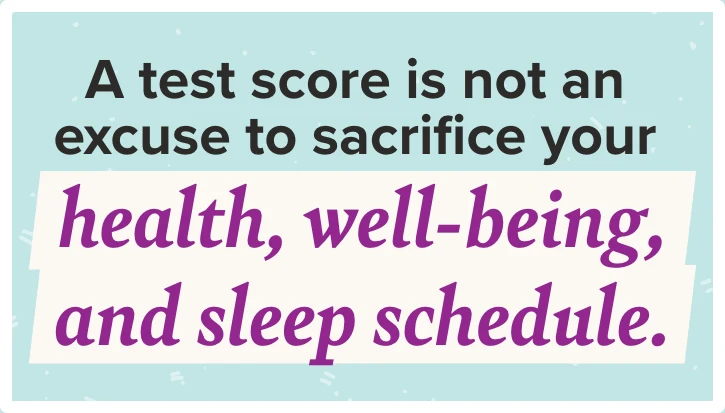
At the end of the day, just because test anxiety is common doesn’t mean you have to let it affect you. By using the three Rs and keeping in mind that one test won’t ruin your life, you can kick test stress to the curb and thrive on any exam.
At UWorld, we believe in helping students make test prep simple. Our Learning Tools are designed to make learning difficult concepts easier, with clear explanations to help you prepare with confidence for your AP, SAT, and ACT tests.
References
- Tornio, S. (2021, January 6). More kids than ever are dealing with test anxiety, and we need to help. We Are Teachers. https://www.weareteachers.com/test-anxiety/
- Causes of test anxiety. School of Medicine. (n.d.). https://medicine.llu.edu/academics/resources/causes-test-anxiety
- Symptoms of test anxiety. Test Prep Review. (2023). https://www.testprepreview.com/how-to-tell-if-you-have-test-anxiety.htm
- Jill Christensen, C. N. P. (2023, July 13). Countdown to take control of anxiety. Mayo Clinic Health System.
https://www.mayoclinichealthsystem.org/hometown-health/speaking-of-health/tips-to-help-ease-anxiety




